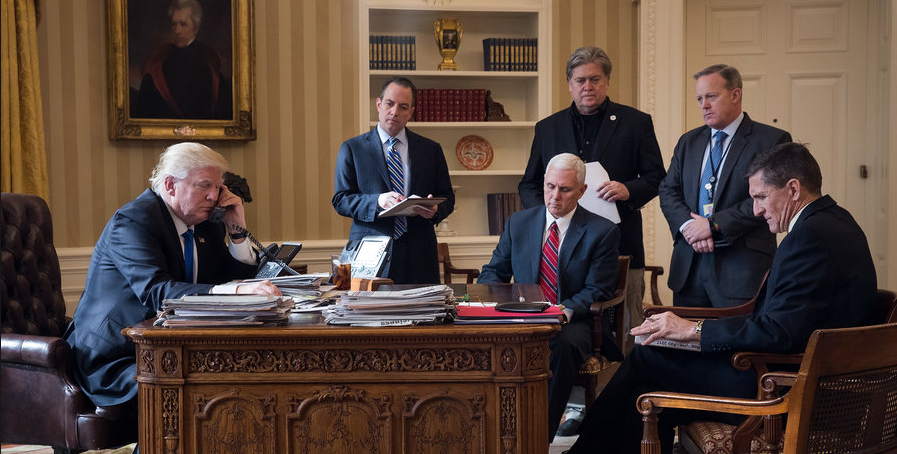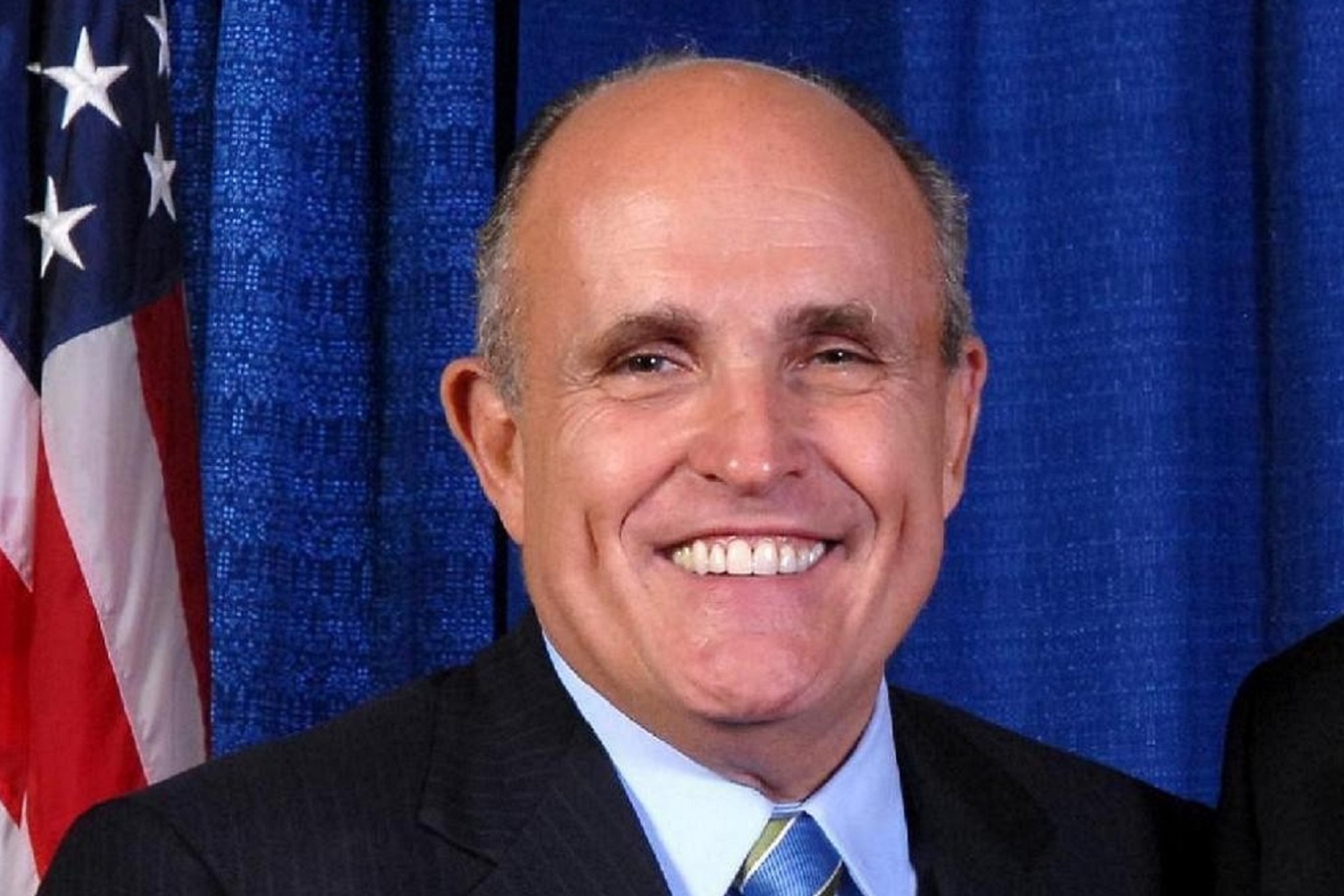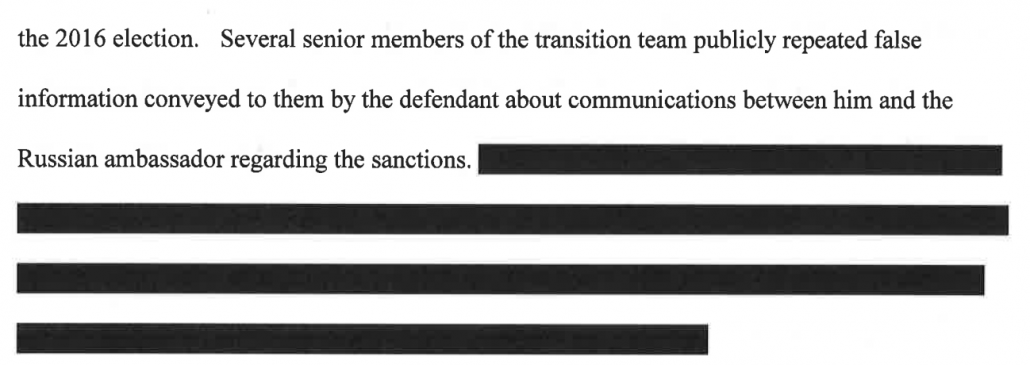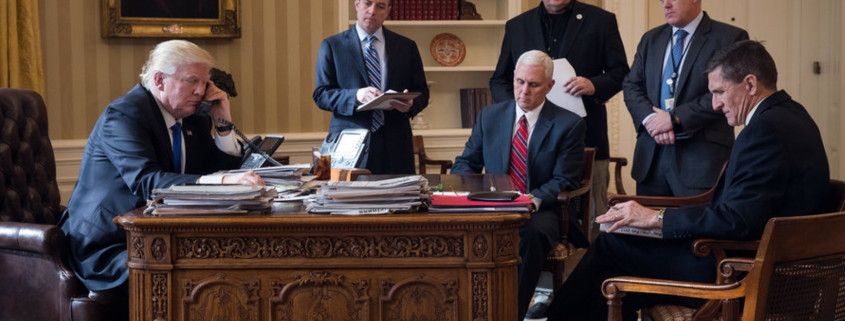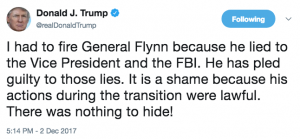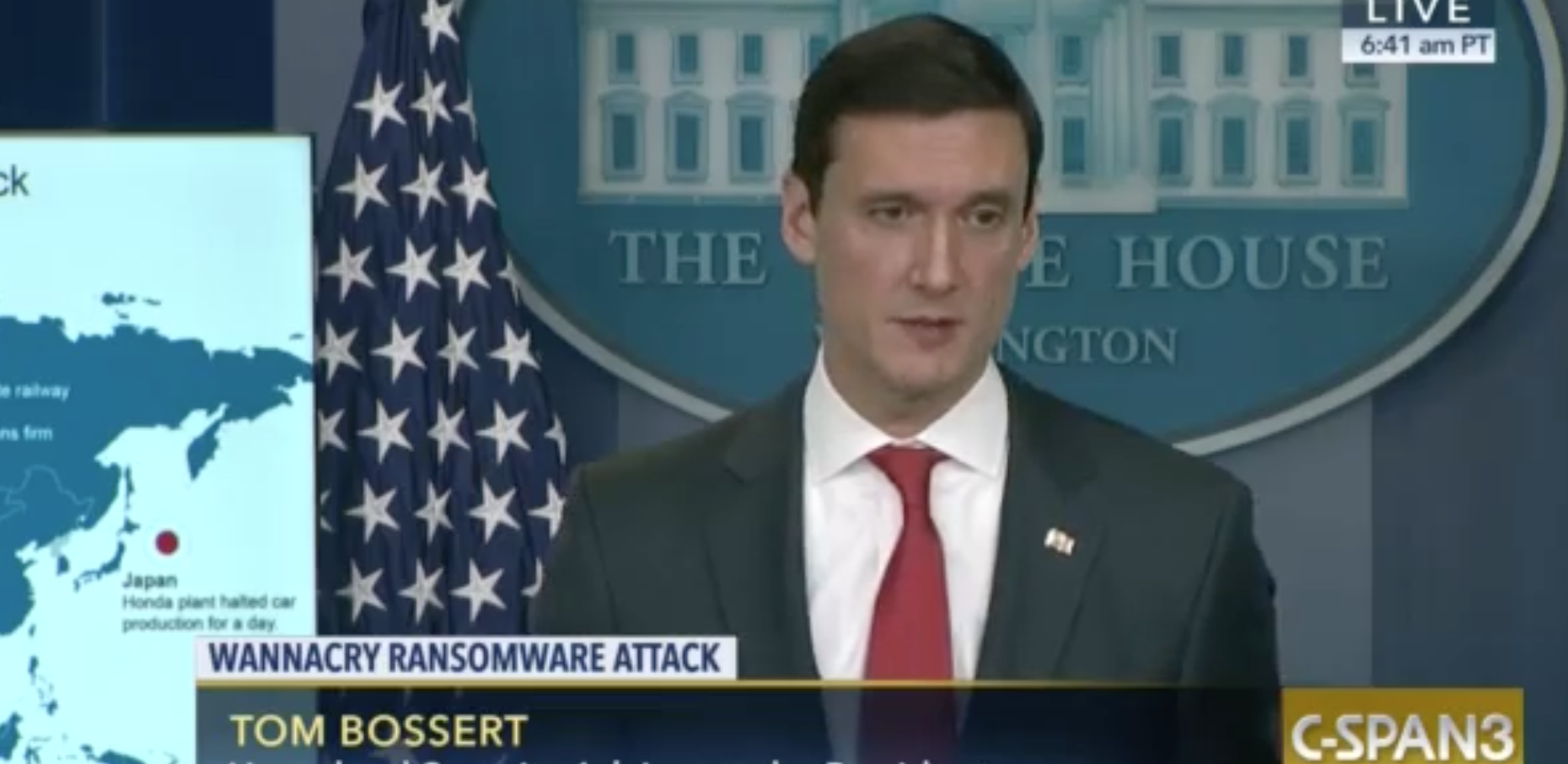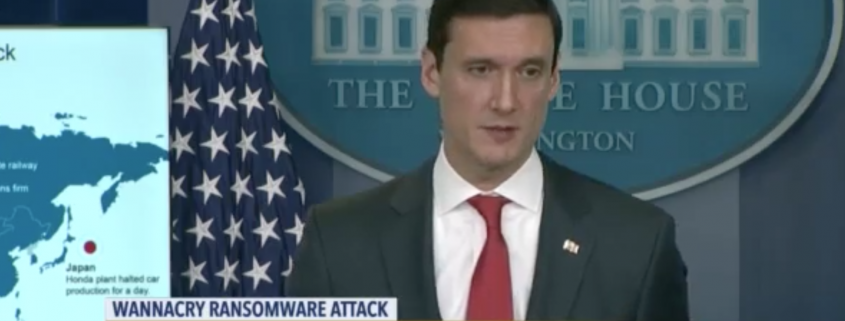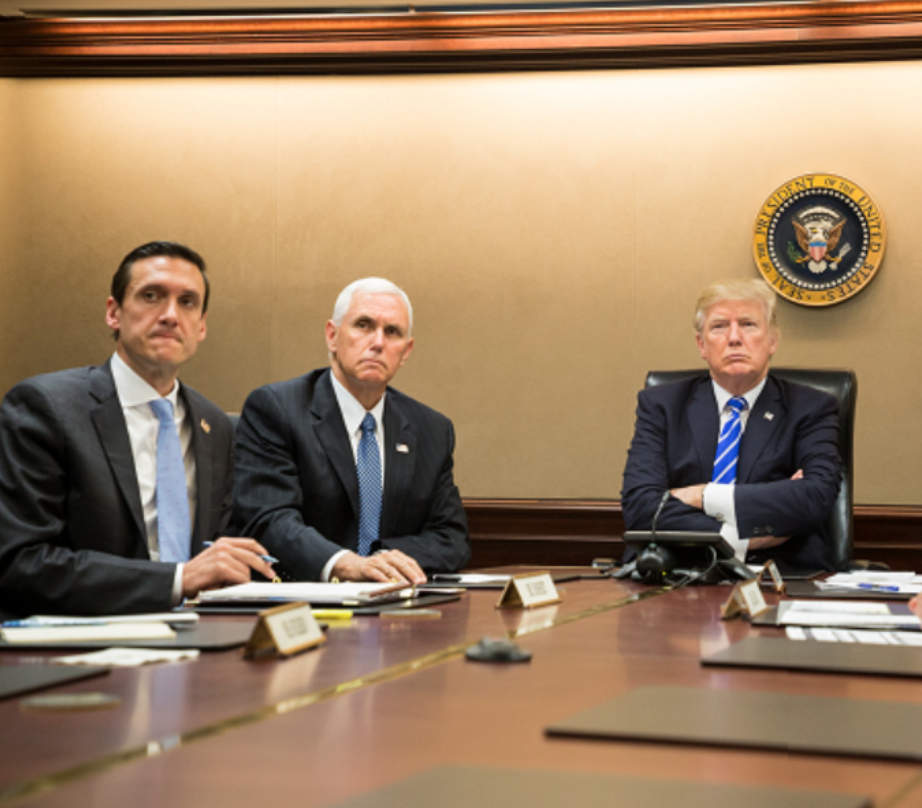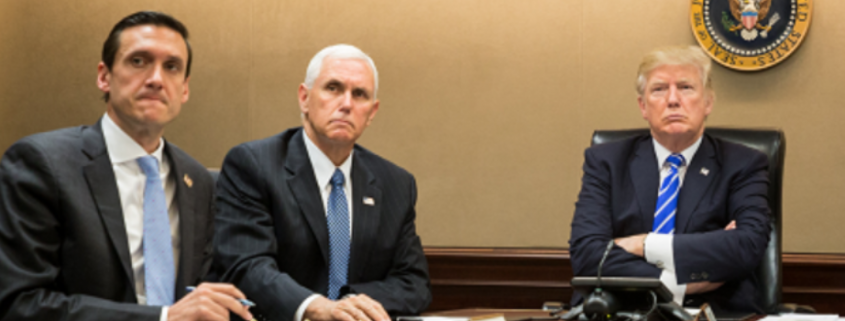Donald Trump Was Personally Involved in Flynn’s “Collusion” with Russia to Protect Israel
As noted earlier, Judge Emmet Sullivan has released the Mueller warrants targeting Mike Flynn. The two pertaining to his lies about the calls with Russia’s Ambassador — an August 2017 one targeting Flynn, KT McFarland, and his scheduler, and a September 2017 one targeting top Trump officials — make it crystal clear that Flynn knew he was lying when he covered up the calls, because he and McFarland were also lying to other Transition officials in real time. The affidavits also explain why Flynn lied: Trump was personally involved in (at least) the effort to undermine a UN effort targeting Israel.
Flynn’s conversations with Kislyak arose directly out of the “back channel” meeting with Jared Kushner
It has long been public that on November 30, 2016, Jared Kushner took a meeting with Sergey Kislyak at which he asked the Russian Ambassador if Russia could set up a back channel for communication with the Transition. Here’s the description from the Mueller Report:
It took place at Trump Tower on November 30, 2016.1139 At Kushner’s invitation, Flynn also attended; Bannon was invited but did not attend.1140 During the meeting, which lasted approximately 30 minutes, Kushner expressed a desire on the part of the incoming Administration to start afresh with U.S.-Russian relations.1141 Kushner also asked Kislyak to identify the best person (whether Kislyak or someone else) with whom to direct future discussions—someone who had contact with Putin and the ability to speak for him.1142
The three men also discussed U.S. policy toward Syria, and Kislyak floated the idea of having Russian generals brief the Transition Team on the topic using a secure communications line.1143 After Flynn explained that there was no secure line in the Transition Team offices, Kushner asked Kislyak if they could communicate using secure facilities at the Russian Embassy. 1144 Kislyak quickly rejected that idea. 1145 4.
It was also public that, following that meeting, Kislyak started working on setting up a meeting between sanctioned banker Sergey Gorkov and the President’s son-in-law.
On December 6, 2016, the Russian Embassy reached out to Kushner’s assistant to set up a second meeting between Kislyak and Kushner. 1146 Kushner declined several proposed meeting dates, but Kushner’s assistant indicated that Kislyak was very insistent about securing a second meeting. 1147
What wasn’t public is that, in response to these same requests for a meeting that (Kushner claimed in his testimony) Kushner rebuffed, he also ordered Flynn to respond.
[On December 6, 2017] The Embassy official also asked Kushner’s assistant to provide him with the contact information for FLYNN and to ask FLYNN to call the Russian Ambassador at either his home number or his cell phone number. Kushner’s assistant forwarded the email chain to FLYNN’s Chief of Staff, cc’ing FLYNN himself, and wrote “Please see the correspondence below and ensure Lt. General Flynn gets in contact with Russian Ambassador Sergey via phone.
That set off a debate. Marshall Billingslea, who had experience in government, recommended they postpone any response until after inauguration. But KT McFarland objected.
Let Flynn make this decision. Russian amb historically does meet with nsc head. Their amb to USA and to UN is of a very high rank with close relations to Putin. Plus Flynn has met with him in past.
McFarland’s stance is completely at odds with the claimed view of both Flynn and especially Kushner that Kislyak wasn’t the right person to liaise with. And it also may explain why she and Flynn hid some of his contacts with Kislyak even from other Transition staffers: because they knew this was wrong.
Trump was probably directly involved in the effort to delay a UN veto condemning Israel
The language from the affidavits on the Kushner-driven effort to undermine Obama’s position on an Egyptian condemnation of illegal Israeli settlements includes several important details.
First, it all started when a “senior advisor to a Republican Senator” reached out to McFarland and others (several at their personal accounts) alerting them that the Obama Administration was not responding to the effort. Jared was very centrally involved in the response.
According to records obtained during the course of the investigation, at approximately 8:46 a.m. on December 22, 2016, FLYNN had a four-minute conversation with Jared Kushner. After that conversation concluded, at approximately 8:53 a.m., FLYNN called the Russian Ambassador to the U.S. FLYNN then called a representative of the Egyptian government and had a four-minute conversation with him. At approximately 8:59 a.m., FLYNN had a three-minute conversation with the Russian Ambassador. Over the next few hours, FLYNN had several additional phone calls with the representative of the Egyptian government.
Remember: The DC Attorney’s Office was investigating a bribe from Egypt that allowed the Trump campaign to stay afloat after they had gone broke in August 2016; Barr shut that investigation down.
The entire UN intervention is way more damning that previously reported. First, it’s quite clear that Flynn reached out to both Russia and Egypt, and because McFarland bragged about his success with others, everyone knew that to be true. That didn’t prevent Kushner from lying to the larger group email about the fact after Egypt announced that they would stand down.
Kushner replied all to that email [including Spicer, Bannon, Priebus, Kellogg, McFarland, Kushner, and one other person whose name is redacted] and wrote: “Can we make it clear that Al Sisi reached out to DJT so it doesn’t look like we reached out to intercede? This happens to be the true fact pattern and better for this to be out there.”
This was a lie. Flynn had reached out, on Kushner’s orders.
Or maybe not just Kushner’s. The affidavit reveals that Trump was involved with this.
At approximately 8:26 p.m. on December 22, 2016, K.T. McFarland emailed FLYNN and Sarah Flaherty and stated that FLYNN had “worked it all day with trump from mara lago.”
Remember, Ric Grenell withheld the transcript from the call Flynn placed to Kislyak on December 22 and in fact the affidavits show Flynn and. Kislyak had two conversations that day (Mueller significantly downplayed Russia’s concessions on the December 23 one). There’s a latter call (the December 29 one) where the analysts suggest that Flynn might be on a speaker phone.
That suggests it’s possible that Trump was on the call with Kislyak, or at least in the room. That might explain why Kushner immediately tried to establish a false record that Egypt had contacted the Trump Transition, not vice versa.
One more thing makes this exchange especially damning. Flynn wrote to the larger group on December 23 and revealed he had called the Ambassador. Then, later that day, McFarland said that Flynn should leak to the press about,
the crucial role [he] played in working your contacts built up over the decades to get administration ambush Israel headed off. You worked the phones with Japanese Russians Egyptians Spanish etc and reversed a sure defeat for Israel by kerry/Obama/susan rice/samantha power cabal.
Those communications make it far less credible that he forgot this effort, which makes the personal involvement of Donald Trump far more interesting.
Note, there appears to be another contact involving Russia (possibly not with Kislyak directly) on December 23 and the affidavits also confirm that Flynn did make a condolence call on December 20 to Russia about the assassination of the Russian Ambassador to Turkey. Grenell did not release these transcripts either.
Flynn lied about his sanctions discussion to hide that Mar-a-Lago was involved
As I have explained, the reason Flynn’s lies to the FBI were material is because he was hiding that he coordinated his calls with Mar-a-Lago. Even Sidney Powell has submitted clear evidence that investigators considered that a key question. Flynn lied to the FBI by saying that he didn’t know about Obama’s sanctions announcement when he contacted Kislyak because he was out of the loop in Dominican Republic. But the timeline laid out the in affidavit makes clear how blatant a lie that was. Here’s what it looks like (I’ve bolded details in this timeline that Mueller hid in the report, as noted in this post):
December 28
11:24AM: Obama Twitter account announces sanctions against Russia, with link to description
December 29
11:49AM: McFarland emails Flynn and three others.
1:53PM: McFarland and other Transition Team members and advisors (including Flynn, via email) discuss sanctions.
2:07PM: Sarah Flaherty, an aide to McFarland, texts Flynn a link to a NYT article about the sanctions.
2:29PM: McFarland, using her GSA phone, calls Flynn (on his personal phone), but they don’t talk.
Shortly after 2:29PM: McFarland and Bannon discuss sanctions; according to McFarland’s clean-up interview, she may have told Bannon that Flynn would speak to Kislyak that night.
3:14PM: Flynn texts Flaherty and asks “time for a call??,” meaning McFarland. Flaherty responds that McFarland was on the phone with Tom Bossert. Flynn informs Flaherty in writing that he had a call with Kislyak coming up, using the language, “tit for tat,” that McFarland used on emails with others and that Flynn himself would use with Kislyak later that day.
Tit for tat w Russia not good. Russian AMBO reaching out to me today.
3:50PM: McFarland (apparently using her GSA phone) calls Flynn, they speak for 6:39 minutes
[Note: Somewhere in here, Flynn called SJC Staffer Barbara Ledeen’s spouse, Michael, which makes her involvement in undermining the investigation all the more corrupt]
4:01PM: Someone (likely Tom Bossert) relays what Lisa Monaco passed on to him to Flynn, McFarland, Bannon, Kellogg, and Priebus explaining that “Russiand [sic] have already responded with strong threats, promising to retaliate. [She] characterized the Russian response as bellicose.
4:20PM: Using his hotel phone in the Dominican Republic (!!!!), Flynn calls the Russian Embassy
4:43PM: McFarland emails Flynn, Kellogg, Flaherty, Spicer, Priebus, Bannon and one other (likely Bossert), saying that, “Gen [F]lynn is talking to russian ambassador this evening.”
4:44PM: Flynn emails McFarland and two others.
Before 5:45PM: McFarland briefed President-Elect Trump, Steve Bannon, Reince Priebus, Sean Spicer, and others on the sanctions. McFarland remembers that someone at the briefing may have mentioned the upcoming Kislyak call.
6:05PM: McFarland emails Gelbinovich and one other person.
After the briefing: McFarland and Flynn speak by phone (they spoke from 6:08 to 6:35PM). Flynn tells McFarland, “that the Russian response to the sanctions was not going to be escalatory because they wanted a good relationship with the incoming Administration,” and McFarland tells Flynn about the briefing with Trump.
10:06PM: Gelbinovich emails Flynn.
This timeline makes clear that Flynn and McFarland spoke about sanctions before Bossert relayed what Monaco had passed on tho him, and Flynn may have reviewed Bossert’s email, reflecting his inquiry to Monaco, before he called Kislyak. Importantly, by the time of the security briefing that day, Flynn had already spoken to Kislyak.
The affidavit then makes it clear how damning it is that McFarland wrote an email deliberately hiding that (she knew) Flynn had raised sanctions with Kislyak:
December 30
5:32AM: Sergey Lavrov says Russia will respond
7:15AM: Putin says they won’t respond
7:29AM: McFarland emails Flynn and two others
8AM: McFarland emails a group (again, Flynn appears to have been on his personal email) stating that Putin was sending a signal to Trump he wants to improve relations
10:50AM: McFarland emails the group again saying that “Putin response to NOT match obama tit for tat are signals they want a new relationship starting jan 20. They are sending us a signal.”
11:41AM: Trump tweets “Great move on delay (by V. Putin) – I always knew he was very smart!”
12:02PM: McFarland sends email to group with summary of Flynn’s call with Kislyak that “does not indicate that they discussed the sanctions”
Flynn would ultimately admit that the text he sent to McFarland that she used to inform the others deliberately left off his mention of sanctions.
Shortly thereafter, Flynn sent a text message to McFarland summarizing his call with Kislyak from the day before, which she emailed to Kushner, Bannon, Priebus, and other Transition Team members. 1265 The text message and email did not include sanctions as one of the topics discussed with Kislyak. 1266 Flynn told the Office that he did not document his discussion of sanctions because it could be perceived as getting in the way of the Obama Administration’s foreign policy.126
The timing, of course, is key: Once Trump weighed in, Flynn built plausible deniability that Trump had initiated outreach to Kislyak. Remember: The transcript shows that Flynn, not Kislyak, raised sanctions.
The affidavits have more on both Flynn and McFarland’s exchanges on December 31, when Flynn told Kislyak that Trump was aware of their calls, as well as details about how Flynn crafted a knowingly false cover story for the press. They also reveal another follow-up call from Russia on January 6.
Together, however, these affidavits make any claim from Mike Flynn that he didn’t deliberately lie to the FBI to be an utter fabrication. He and McFarland were lying to top Trump officials in real time. They were doing so to hide Trump’s personal involvement in all this from their own colleagues.
The affidavits also make it clear that the US government has abundant evidence to prove that Mike Flynn lied, just with the paper trail and the testimony of Trump officials as well as abundant DOJ documents helpfully released by Sidney Powell showing that every single account of Flynn’s interview DOJ has tracks with the 302 on which he was charged. They don’t need Peter Strzok or Joe Pientka’s testimony to prove Mike Flynn lied. Flynn and McFarland already made that case.
And we know why Flynn lied: Trump not only knew of Flynn’s calls to Kislyak. He may have been on the line for the Israeli-related ones.

